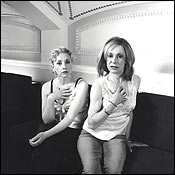
In their comfortable uptown apartment, Darryl and Mitzi rush around preparing to receive Ron and Gail, old friends they’ve invited over for a quiet night of dinner and fornicating. No wild youths, these four: They have grown kids, fancy jobs, easy chairs. (Mom didn’t take their weed away; the maid did.) When the time for libidinous escapades arrives, Darryl has just the thing to get everybody hot: Dionne Warwick songs.
Elaine May treats this fumbling foursome, and her other characters in After the Night and the Music, with affectionate ridicule. In her trio of one-acts at the Biltmore, she encourages us to laugh at and with her insecure, melancholy, status-anxious New Yorkers. This is not exactly a novel approach to comedy: May’s scenarios carry the scent of Woody Allen, Neil Simon, and, well, Elaine May, whose ingenious improvisations with Mike Nichols helped define the genre 40 years ago.
But this strain of fraught uptown romance hasn’t felt fresh, in anybody’s hands, for years. On television, the comedy of Manhattan anxiety reached a state of purity with Seinfeld, and then a state of deep impurity in Sex and the City—each series presenting its own quartet of urban neurotics and narcissists, each using a vocabulary that felt sharply contemporary. Since the heyday of those shows, neither May nor her peers have written a script that felt lively or vital. The old comic tension between pseudo-intellectuals and their carnal urges hasn’t yielded the same laughs; even if the style hadn’t been refined by Carrie and Jerry and George, repeated jokes are bound to lose their punch. It’s telling that, if reports from Cannes prove accurate, Allen may have regained his stride by adopting a new style, fleeing the city entirely and filming his latest in London.
Elaine May still knows her way around a punch line, God knows, and in Daniel Sullivan’s production for Manhattan Theatre Club, many of them land. “Vodka—less fattening than wine, because you need less. So don’t think I’m not watching my diet,” explains Jeannie Berlin, May’s daughter, as she takes a pull. J. Smith-Cameron shines in a series of roles, particularly as the funny, pushy Mitzi—all blonde curls and steel. But there’s rarely a feeling of inspiration or momentum. The laughs keep dribbling away.
Instead, May extracts something different from this overworked vein: pathos. “Here is why I am not depressed,” say four monologuists in Giving Up Smoking, ticking off a list of reasons. They’re waiting by the phone, intending to receive a call or to make one; they are sick or sad and lonely and likely to stay that way. “Sometimes I want to kiss my husband’s lips so much I can feel them against my mouth,” says Joanne (Berlin) at one point. That is lovely writing and should be another of the play’s moving moments. Alas, Berlin’s dramatic chops don’t begin to match her comic delivery, a cockeyed, behind-the-beat drawl.
Only once does May achieve the kind of comic sympathy she seems to desire. In the brief Curtain Raiser, a zhlubby guy at a club asks a woman to dance. They are an unlikely pair, what with him being short, stout, and sporting an optimistic comb-over and her being a lesbian. Even at its minimal length, the script needs four more jokes and four fewer loose ends. Still, Eddie Korbich glows as the ugly duckling transformed into a slightly less ugly dancing machine. As he makes his ungainly, elated leaps around the stage, choreographer Randy Skinner achieves something rare. A few weeks back, an article in the New York Times complained of the lack of good dancing on Broadway. Here, in the last place you’d expect to find it, are dances that are memorable, rich in character, and charmingly original—just what you wish the whole show would be.
After the Night and the Music
by Elaine May.
directed by
Daniel Sullivan.
Biltmore Theater.